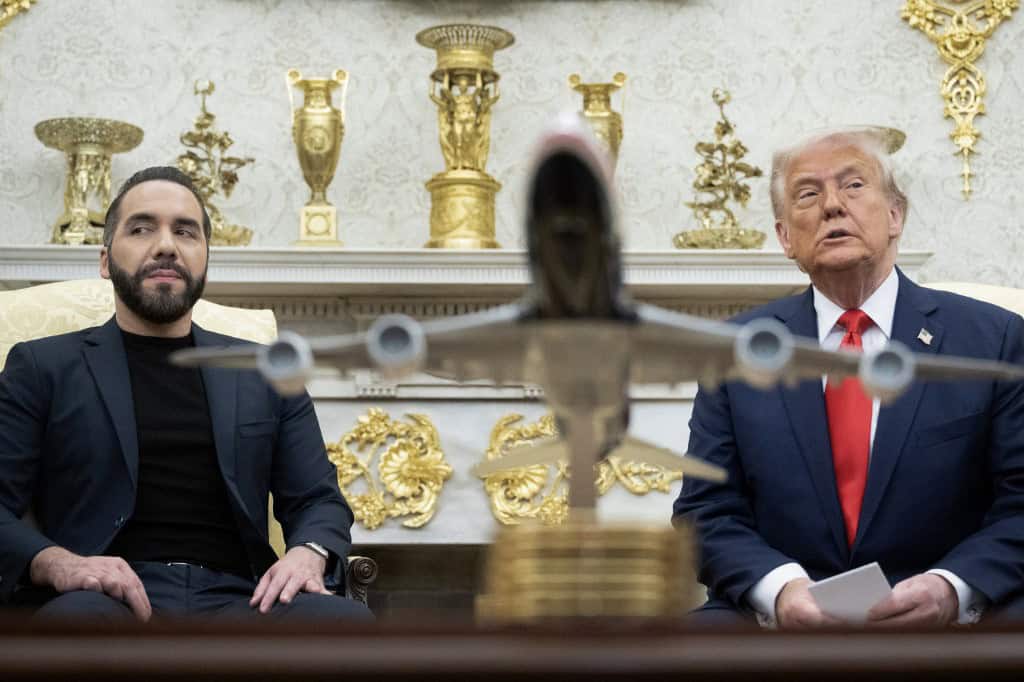“We are very eager to help,” Salvadoran President Nayib Bukele assured this Monday at the White House to a Donald Trump delighted to hear what his best friend from Latin America was telling him, who has imprisoned hundreds of migrants deported by the United States under the accusation of being gang members.
The rapport between the Salvadoran president and the American president was evident during the beginning of the meeting in the Oval Office, by far the most relaxed of the Republican’s second term. The visit began with a handshake and ended with Bukele giving a thumbs up when journalists asked him how the meeting went.
“They are helping us. We thank you,” Trump said, surrounded by his cabinet’s top leadership, including diplomatic chief Marco Rubio, Interior Security Secretary Kristi Noem, and Attorney General Pam Bondi. “We are very happy and eager to help,” Bukele affirmed.
“In fact, Mr. President, you have to liberate 350 million” Americans from criminals, but to do so “you have to imprison some. That’s how it works, right?” opined the Salvadoran leader, who, like Trump, is waging a war against gangs. Trump agreed with him. They also agreed on the fate of Salvadoran migrant Kilmar Ábrego García, deported by “mistake,” as the U.S. administration acknowledges.
I don’t have the power
U.S. justice asks the government to facilitate bringing him back, but the White House disagrees. Trump gave the floor to several cabinet members to explain why they don’t want to. “No U.S. court has the right to direct the foreign policy of the United States. It’s that simple, end of story,” Rubio concluded.
Senate Democratic leader Chuck Schumer criticized this comment. “It’s complete nonsense. The law is clear, due process was seriously violated, and the Supreme Court has clearly stated that the Trump administration must facilitate and make effective the return of Kilmar Ábrego García,” he stated in a press release.
Journalists asked Bukele. “How can I send him back to the United States? Like sneaking him into the United States? (…) I don’t have the power to send him back to the United States,” he responded. The government has sent hundreds of irregular migrants, mostly Venezuelans, to a high-security Salvadoran mega-prison, invoking the 1798 Foreign Enemies Act, which until then had only been used in wartime.
It accuses them without proof of being gang members.For the first group of over 200 people, it paid six million dollars, according to the White House. The last group of 10 arrived over the weekend.Will he send more? “As many as possible,” Trump answered, who also does not rule out expelling Americans.
“I’m in favor, because we can do things with the president for less money and have great security. And we have a huge prison population,” explained the Republican magnate, although he specified that legal feasibility is being examined. They also agreed on preventing transgender athletes from participating in female competitions.
“Do you allow men to participate in women’s sports? Do you allow men to box with your women?” Trump asked.”That is violence,” Bukele responded. There were moments for jokes.
Looks like an adolescent
“I have the best relationship with him. We know each other. I’ve known him since he was very young, as I said, very, very young. And he impressed me. I said, look at this guy. In fact, he looks like an adolescent,” Trump commented about Bukele, who once described himself as a “cool dictator”.
Bukele is the first Latin American president to set foot in the Oval Office during Trump’s second term, who has received others at his private residence in Florida. The meeting takes place amid Trump’s tariff hurricane, from which El Salvador was not spared. It pays the minimum 10% universal tariff imposed by Washington on all its partners to reduce the trade deficit, sanitize public finances, and relocate many industrial activities.
The United States is the main destination for El Salvador’s exports, an ultra-secure country according to the State Department, which this month moved it from level 2, which it shared with countries like Spain, to level 1, the best. The 2.5 million Salvadorans living in the United States are a support for their country’s economy through the remittances they send (23% of GDP in 2024).






